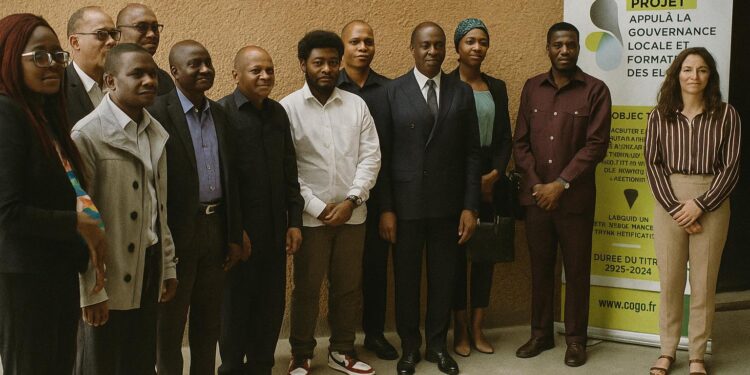Workshop frames a pivotal policy moment
On 11 July 2025 the Centre for Action for Development gathered some thirty municipal councillors, civil-society advocates and ministerial technicians in a modest conference hall overlooking the Congo River. Their shared brief—probing how local development plans are drafted, executed and audited—may sound technocratic, yet in a nation where 47 per cent of citizens reside outside the capital the stakes are unmistakably political. The workshop falls four months before the Ministry of Decentralisation is due to transmit its revised guidelines for the 2026-2030 planning cycle, a calendar confirmed by a senior official under the customary seal of anonymity.
From top-down directive to negotiated roadmap
Lead trainer Guerschom Gobouang argued that conventional top-down templates often miss the granular realities of hinterland districts, a view corroborated by recent World Bank diagnostics on service delivery gaps in Pool and Cuvette (World Bank, 2024). His prescription is the inverse pyramid: community forums distil priorities, technical cells translate them into costed matrices, and elected bodies institutionalise the outcome. Such sequencing, he contended, ‘anchors human rights in budget lines’ rather than in declaratory rhetoric.
State endorsement without ceding stewardship
Government interlocutors at the session welcomed the methodology while stressing the need for coherence with the National Development Plan and the president’s Horizon 2030 vision. ‘Subsidiarity is not a synonym for fragmentation,’ remarked José Dinga, policy adviser in the Prime Minister’s office, adding that treasury oversight remains vital to prevent parallel budgeting. His intervention illustrates how Brazzaville seeks to blend participatory impulses with macro-fiscal prudence, a balance praised by the African Development Bank in its 2023 governance review.
International financing architecture gains traction
The two-year project, underwritten by the United Nations Democracy Fund, provides a modest yet catalytic three-million-dollar envelope channelled through competitive municipal grants. According to UN Resident Coordinator Chris Mburu, the instrument rewards councils that demonstrate ‘credible community consultation and measurable gender outcomes’. Parallel dialogues are under way with the European Union and the Central African Forest Initiative to integrate climate-resilient infrastructure into forthcoming local plans, documents seen by this publication suggest.
Navigating fiscal realism and popular aspiration
Even with fresh tools, translating aspiration into asphalt remains arduous. Many rural communes collect barely twenty per cent of projected own-source revenues, limiting their counterpart funding. CAD recommends phased execution schedules that shield essential social programmes while deferring capital-heavy projects until external co-financing matures. The Ministry of Finance is reportedly exploring a performance-based transfer formula to reward communes that meet quarterly reporting standards, mirroring reforms adopted in Rwanda (IMF, 2023).
Monitoring, evaluation and diplomatic optics
Robust monitoring was another workshop leitmotif. Trainees learned to align indicators with the African Union’s Agenda 2063 and the UN Sustainable Development Goals, thereby easing future grant compatibility. For Congo’s diplomatic partners, such alignment reduces due-diligence friction and projects an image of methodological seriousness. A European diplomat attending the closing session observed that ‘credible sub-national data are the new passport to concessional resources,’ a sentiment mirrored in recent OECD guidance.
Civic trust as strategic asset
Beyond spreadsheets, the exercise nurtures civic trust. By inviting market-women, youth cooperatives and traditional chiefs into the planning tent, authorities signal an openness that election observers have often urged. Sociologist Mireille Ngatsé notes that when citizens witness their own priorities—say, a feeder road or a maternity wing—enter the communal ledger, compliance with local taxes typically rises, easing the state’s fiscal burden and reinforcing social cohesion.
Consolidating gains amid regional headwinds
Congo’s decentralisation experiment unfolds in a sub-region buffeted by fiscal shocks and political transitions. Yet Brazzaville’s relative stability has allowed incremental institutional craftsmanship. Analysts caution that momentum could stall if petroleum revenues dip sharply, but contend that embedding participatory routines now will insulate communes from cyclical volatility. The presidency’s recent directive encouraging ministries to publish sectoral budget ceilings ahead of municipal drafting sessions is viewed as a concrete confidence-building measure.
Outlook for the 2026 planning round
As the final coffee flasks were cleared from the workshop tables, participants drafted a communiqué urging the swift validation of updated local-plan guidelines and the creation of inter-municipal peer-review clusters. The communiqué, already transmitted to the Ministry of Decentralisation, underscores a shared conviction that participatory planning has graduated from pilot to policy. With donor tranches linked to demonstrable progress, and with the political leadership signalling receptiveness to data-driven proposals, Congo-Brazzaville appears poised to convert deliberative energy into tangible improvements across its diverse territories.











































